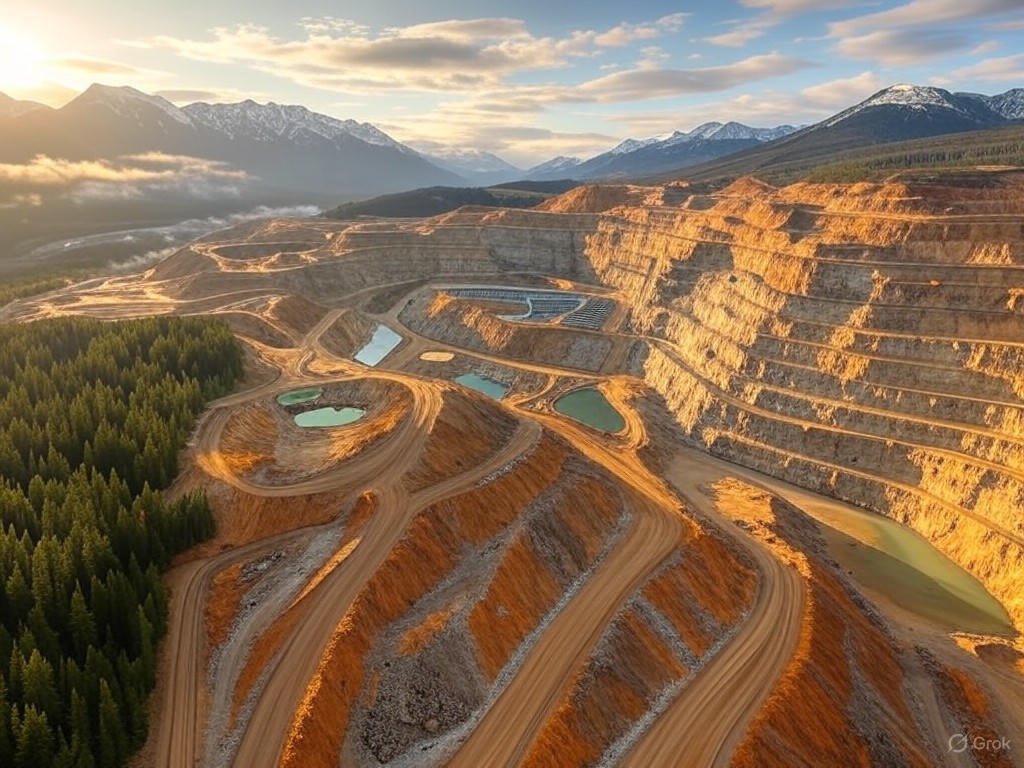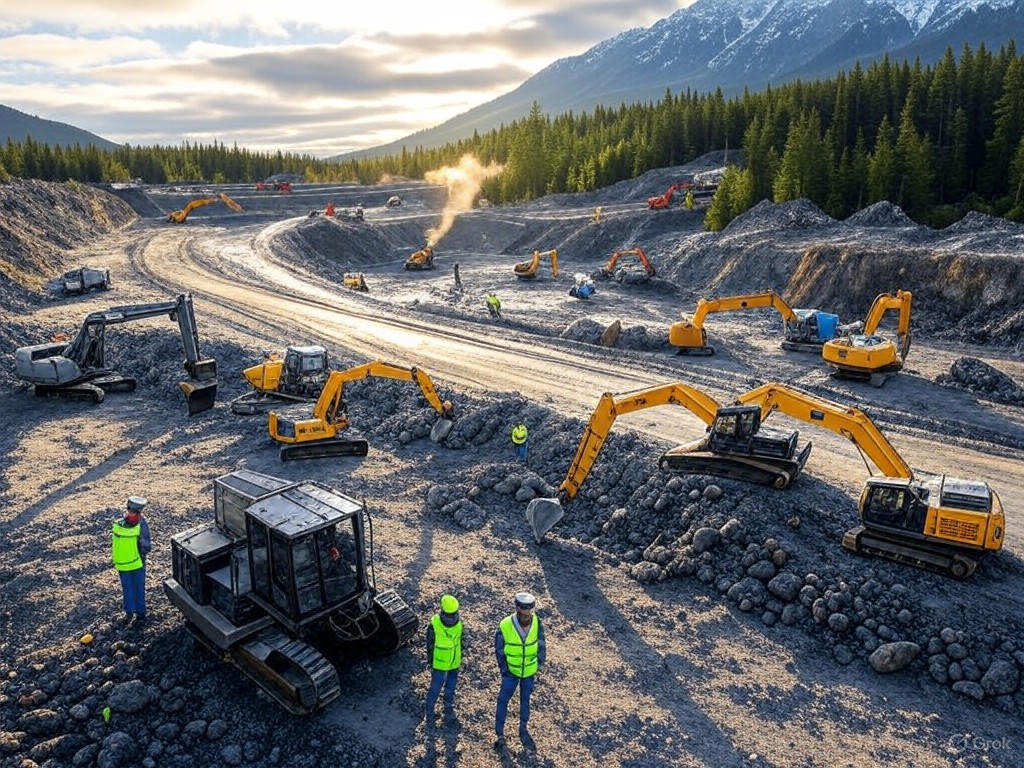BC’s Critical Minerals: A Global Tech Lifeline
In the vast, rugged expanses of British Columbia, where snow-capped mountains meet untamed wilderness, lies a treasure trove that quietly underpins the modern world's technological marvels. Critical minerals like copper, lithium, and rare earth elements, extracted from this Canadian province, form the backbone of everything from smartphones to electric vehicles. Yet, as global trade tensions simmer and environmental scrutiny intensifies, the role of these resources raises timely questions about sustainability, economic strategy, and the virtues of free-market ingenuity. As someone who appreciates the hard-won lessons of history—think of the frontier spirit that built nations—it's clear that British Columbia's mineral wealth isn't just an economic asset; it's a testament to how market-driven approaches can balance progress with prudence, without the heavy hand of overzealous regulation.
This narrative isn't just about rocks and rare metals; it's about the global economy's lifeblood. British Columbia, with its rich deposits, has emerged as a key player in supplying the materials that fuel technological innovation. But let's not romanticize it excessively—after all, as any seasoned observer knows, the real story lies in the interplay of commerce, innovation, and the occasional bureaucratic hurdle that could stifle it all.
The Strategic Importance of BC's Critical Minerals in Global Tech
British Columbia's critical minerals are more than mere commodities; they are the unsung heroes of the technology sector. Copper, essential for electrical wiring and renewable energy infrastructure, and lithium, a cornerstone of batteries in electric vehicles and grid storage systems, flow from BC's mines to factories worldwide. According to a recent analysis, these minerals account for a significant portion of Canada's exports to tech-heavy economies like the United States and China, bolstering global supply chains that drive economic growth Wall Street Journal. In 2022 alone, BC's mineral sector contributed over $10 billion to the provincial economy, supporting jobs in mining, processing, and related industries.
The tech industry's reliance on these resources is profound. Smartphones, quantum computers, and advanced semiconductors demand rare earth elements, many of which originate from BC's geologically blessed terrain. Imagine a world without these minerals: electric vehicles grinding to a halt, data centers going dark. It's no exaggeration to say that BC's output helps sustain the digital age, fostering innovation that enhances everyday life. Yet, this dependence exposes vulnerabilities in global trade. As geopolitical rivalries escalate—witness the U.S.-China tussles over supply chains—nations are eyeing BC as a stable, democratic alternative to riskier sources.
From a center-right perspective, this underscores the beauty of free markets: they reward efficiency and adaptability without mandating top-down controls. Rather than imposing rigid quotas or subsidies, policymakers should encourage private investment in exploration and extraction, allowing market signals to guide resource allocation. After all, as history shows, it's the entrepreneurs and innovators who turn raw materials into global commodities, not government decrees.

This image captures the intricate balance of industry and nature at a BC copper mine, where modern extraction techniques minimize ecological disruption while maximizing output.
Navigating Trade Pressures and the Push for Sustainable Mining
Of course, no discussion of critical minerals would be complete without addressing the environmental pressures that shadow every ton extracted. Sustainable mining in British Columbia isn't just a buzzword; it's a pragmatic necessity in an era of heightened scrutiny. The province's mines operate under frameworks that emphasize reclamation and reduced emissions, but the real challenge lies in scaling these practices amid global trade dynamics. With demands for "green" minerals rising—from Europe’s carbon tariffs to U.S. incentives for clean energy—BC must tread carefully to remain competitive.
Trade pressures are intensifying. The ongoing shifts in global supply chains, exacerbated by events like the COVID-19 pandemic, have highlighted the risks of over-reliance on a few suppliers, particularly China, which dominates rare earth production IEEE Spectrum. British Columbia, with its stable regulatory environment and access to North American markets, stands as a beacon of reliability. Yet, environmental activists and international bodies often call for stricter standards, which could inadvertently raise costs and deter investment. Here's where a center-right lens proves illuminating: instead of blanket regulations that stifle growth, we should champion market-based solutions like carbon pricing or voluntary certification programs. These approaches incentivize companies to innovate—perhaps developing more efficient extraction methods—without government micromanagement that could lead to job losses or economic stagnation.
Evidence from recent studies supports this view. A report from the Natural Resources Canada highlights how BC's mining sector has reduced its carbon footprint by 15% over the past decade through technological advancements, driven largely by private sector initiatives rather than mandates Mining Association of Canada. Similarly, economic analyses show that free-trade agreements, such as the USMCA, have boosted BC's mineral exports by creating a level playing field, where quality and efficiency, not subsidies, determine success Economist Intelligence Unit. These outcomes illustrate how traditional values—stewardship of resources, hard work, and fiscal responsibility—can coexist with environmental goals, fostering a robust economy without succumbing to alarmist rhetoric.
In practice, sustainable mining in BC involves techniques like bioleaching and water recycling, which minimize waste and preserve local ecosystems. Companies like Teck Resources have pioneered these methods, turning potential environmental pitfalls into competitive advantages. But let's not kid ourselves: achieving this balance requires resisting the temptation for excessive intervention. Overly stringent policies could drive operations overseas to less regulated areas, undermining global efforts for sustainability and economic stability.
Evidence and the Path Forward: A Balanced Economic Vision
To appreciate the full picture, consider the data. British Columbia's critical minerals sector not only supports over 30,000 jobs but also contributes to technological advancements that enhance global productivity. For instance, lithium from BC helps power the batteries in Tesla vehicles, reducing reliance on fossil fuels and spurring innovation in clean energy Wall Street Journal. Yet, as trade barriers evolve—such as potential tariffs on minerals from non-compliant regions—BC's role becomes even more pivotal.
This brings us to the evidence of market efficacy. Studies from institutions like the Fraser Institute rank BC highly for mining investment attractiveness, attributing this to its pro-business policies and minimal bureaucratic red tape Fraser Institute. In contrast, regions with heavy government intervention often see delayed projects and higher costs, proving that limited intervention allows for faster adaptation to environmental and trade challenges.
In conclusion, British Columbia's critical minerals are not just vital to global tech industries; they embody the principles of a free-market economy that values innovation, responsibility, and long-term prosperity. By prioritizing sustainable practices through incentives rather than mandates, we can navigate trade pressures and environmental concerns without compromising economic vitality. As I see it, this approach honors traditional values—self-reliance, prudent resource management, and the entrepreneurial spirit—that have always driven progress. Policymakers should resist the urge for overregulation and instead foster an environment where businesses can thrive, ensuring that BC's minerals continue to light up the world’s tech landscape for generations to come.
Let’s not forget: in the grand tapestry of global trade, it's the steady hand of market forces, not the fleeting grip of policy fads, that carves the path to a brighter future.

This photo illustrates the innovative lithium mining operations in BC, showcasing how technology harmonizes with the natural landscape to support sustainable practices and global tech demands.

